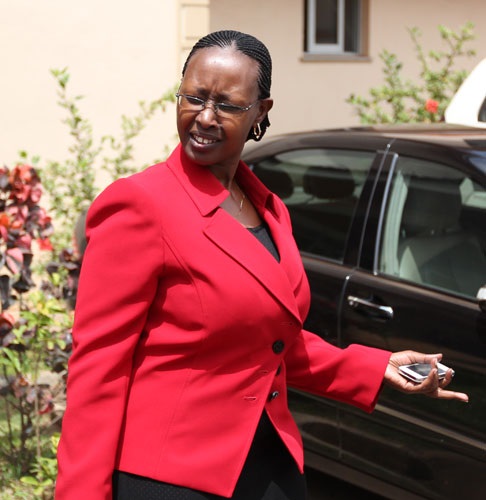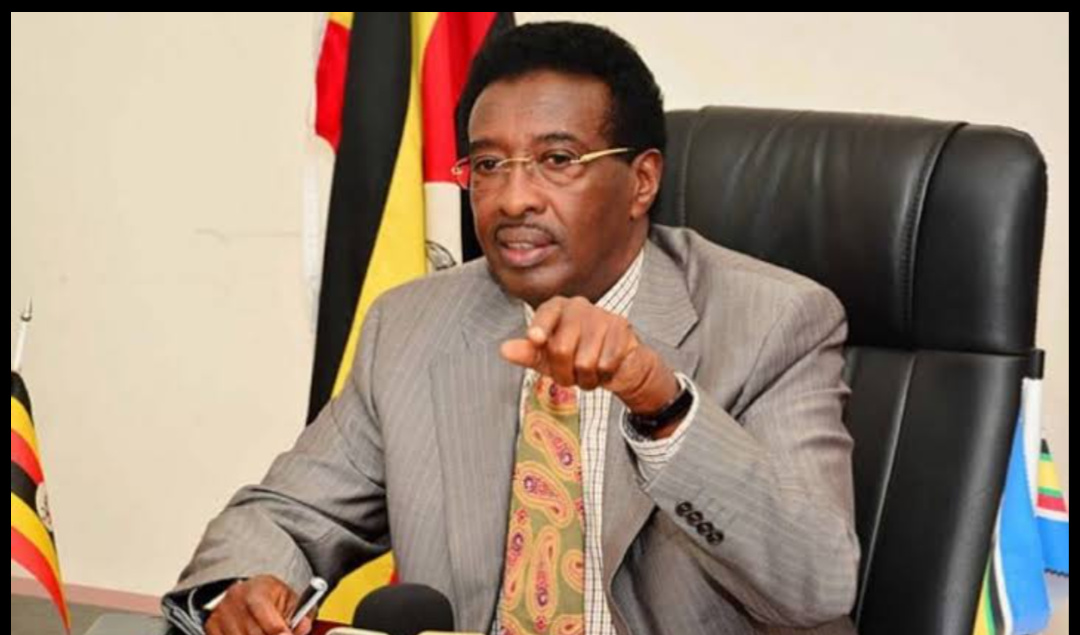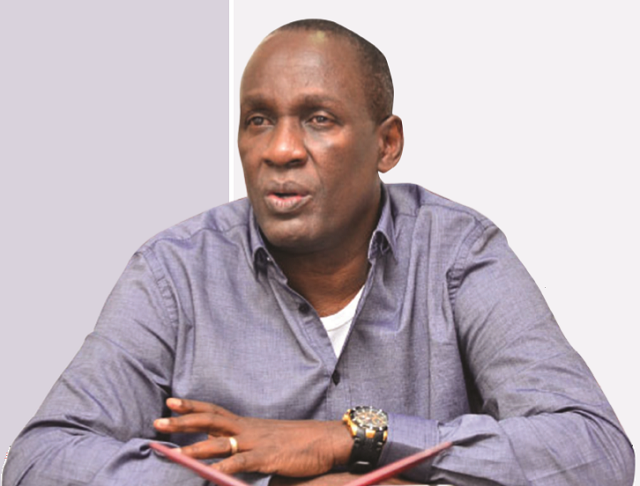
KAMPALA – When Museveni ousted his 89 line up of ministers to steer his government on June 8, 2021, among them was Jim Muhwezi and Alice Kaboyo whose integrity had been tainted with the Global Alliance for Vaccines and Immunization (GAVI) fund scandal. Kaboyo who was then co-accused with three former Health Ministers Jim Muhwezi, Mike Mukula and Dr Alex Kamugisha was sentenced to eight years in prison or a fine of Ugx20 million.
Whereas Jim Muhwezi, Mike Mukula and Alex Kamugisha were eventually aquited, Alice Kaboyo confessed and pleaded guilty to two counts of abuse of office and writing documents in the name of the former Private Principal Presidential Secretary, Amelia Kyambadde. For saving court’s time, she was treated with glove hands and received a lenient fine not befitting the amount of money that had disappeared under her hands. She disappeared from the public scene until when President Museveni appointed her Minister of State in the Office of the Prime Minister for Luwero Triangle-Rwenzori region.
When the two appointees appeared before the Parliamentary appointments committee for vetting, Jim Muhwezi sailed through but Alice Kaboyo was rejected citing her 2012 conviction arising out of her own confession before the anti corruption court which rendered her guilty of some of the offences as charged. The court did not make orders for a refund of the outstanding balance and thus whatever she had taken from the GAVI fund became her loot for keeps.

To date nobody knows why out of the Ugx524 million which had been advanced to Kaboyo to prepare advocacy conferences, she had only refunded Shs250 million but Ugx274 remained unaccounted for. Therefore, a fine of Ugx20 million was not sufficient to remedy the theft but government being government, you can be sure that some god father played the master card.
It is said that the President was furious when Kaboyo was rejected and even went ahead to write to the Speaker and the Parliament’s Appointments Committee explaining his reasons for appointing Kaboyo. Whether the President’s communication was an order or guidance, Kaboyo had to be approved; after all, many of the members of the appointments Committee are NRM and could not afford to go against the decision of their party chairman. It is alleged that one of the grounds Museveni raised in justifying Kaboyo’s approval was that Jim Muhwezi with whom she had been charged had been approved by the same committee and rejecting Kaboyo was discriminatory and selective.
I personally retaliate that Kaboyo’s appointment and subsequent approval is an attack on the Anti-Corruption fight even when the constitution gives the President executive authority under Article 99 which authority must be exercised in conformity with the Constitution and the laws of Uganda which include the Anti-Corruption Act. The President cannot hide his actions under the executive authority to appoint any person without following the laws of Uganda.
Reasons why the committee over turned its own decision were not given but Kaboyo sailed through at the second chance. 22 of the NRM legislators voted in favour of Kaboyo’s approval while 4 Opposition MPs again rejected her approval and one of the members abstained. It is alleged that the committee re-considered its earlier position because Kaboyo was remorseful and paid fines imposed by the court. I don’t think being remorseful overrides the provisions of the Anti Corruption Act which imposes a mandatory 10 years without taking up a public office upon conviction under any of the offences outlined. After all, court imposed a small fine because Kaboyo had claimed to be remorseful and had refunded part of the money taken and also because she pleaded guilty and saved court’s time.
Irrespective of the GAVI Fund sentiments and the public outcry to throw out Kaboyo on the basis of integrity, the President was determined to have Alice Kaboyo as a minister against all odds and indeed he returned her name and after some lobbying, she was approved paving way for her swearing in. Kaboyo previously served at State House aide and at one time headed the youth desk of the NRM then located at Baumann house near parliament.
The President of Uganda needs to be reminded that a conviction is a conviction whether somebody settles the alternative punishment or serves a jail term. Kaboyo chose to pay the fine but according to the Anti-Corruption Act, she is disqualified from holding public office for a period of 10 years from the time of her conviction. That sentence and conviction has never been varied or set aside and was also not appealed against; it still stands hence rendering Kaboyo’s approval void given the provision under the Anti-Corruption Act. Kaboyo’s 10 years imposed by law were due to expire in the year 2022.

But why does the President insist on working with or appointing people whose hands are tainted with scandals involving corruption? Uganda has a population of about 40 plus million people with atleast 5 million qualified to hold positions such as members of Parliament or ministers. Sam Kutesa has been a minister of foreign affairs almost his entire life despite his involvement in a number of scandals where he has emerged victorious not because he was innocent but because he knew his way around systems. Mike Mukula is representing the eastern as a member of the Central Executive Committee of the NRM despite his past records with the GAVI funds.
Previous Parliaments have stood their ground on Ministers whose integrity is questionable. In 2012, the late Nasser Ssebaggala was rejected as a Minister without Portfolio on grounds that he was an ex-convict.In 2016, the appointment of Mr. Adrian Tibaleka was not approved after failing to convince MPs that she qualified to be a minister.
All said and done, what does it mean for the President to continue appointing people to public offices without considering their past records? The conduct of a Public Officer is expected to be beyond reproach. Public Officers are regarded as custodians of the public trust and as such, they are required to adhere to the highest standard of morality and their past record is largely intermarried with their future. Ethical rules require a Public Officer to manifest the highest degree of integrity in the conduct of public affairs. Public Officers are expected to refrain from using their Government positions for personal, private pecuniary or partisan gains.
Section 46 of the Anti Corruption Act requires no scientific interpretation. The wording of the Section in my view is unambiguous and means Kaboyo is still under monitoring until 2022. It is possible to adduce the meaning of the words used without recourse to other conjectures. It is such a provision that one can apply the literal rule of interpretation, and confidently obtain the right interpretation. How do we know Kaboyo is remorseful until the expiry of 10 years?
The use of the words; “A person who is convicted of an offence under Section…” as used under Section 46 of the Anti-Corruption Act refers to anybody who is charged under those Sections of the Act, and ends up with a conviction. A convict, “Shall be disqualified”.The “Black’s Law Dictionary” 6th Edition defines “shall” as used in statutes that: This word is generally imperative or mandatory….. the word “shall” is a word of command; and one which has always or which must be given a compulsory meaning, as denoting obligation. The word in ordinary usage means “must” and cannot be modified to serve a different meaning.
The use of the words “Shall be disqualified from holding a public office for a period of 10 years from his or her conviction,” imposes a statutory ban on any convicted person under the said sections from holding a public office from the time of conviction to the time frame of 10 years thereafter. It is a self-regulating order in-built within the statute itself to accompany every conviction meted out against all convicts under this law. It is a stand-alone provision which comes into operation upon conviction- where there is no appeal. Once convicted, the law barred Kaboyo from holding a public office from date of conviction, irrespective of whether she served the sentence or paid the fine imposed as an alternative punishment.
Many have argued that appointing somebody who is tainted with corruption into public office sends a wrong signal to the public, it means the public will not be afraid to do wrong aware that impunity is the order of the day. It shows that once you are loyal or once you support the regime, you can easily get away with issues around corruption.
But let us approach this issue objectively. Let us assume that Kaboyo did not have the Ugx 20 Million fine imposed upon her as an alternative punishment and opted for the 8 years sentence. At what point would her 10 years envisaged under Section 46 of the Anti Corruption Act start running. Is it at the point of conviction or after serving the 10 years. The answer is that the 10 years start running immediately a conviction is pronounced and no appeal is preferred.
Is it not possible that Section 46 of the Anti corruption Act imposes a double punishment to somebody like Kaboyo who was fined Ugx10 Million for that same offence. It is like throwing somebody down and then follow it up with kicks. Does it not amount to a double punishment yet the law says no one shall be punished twice for the same offence. Well until the law is amended, the 10 years will remain a punitive measure intended to serve as a warning to the general public to avoid playing with public resources.
Until then, section 46 of the Act is couched in mandatory terms. Once convicted for any of the listed offences therein, you automatically cease to hold any public office under the law for 10 years from the date of conviction. It would therefore be a mockery of the law and morality for the President to appoint a convict and thereafter influence the appointments committee to approve Kaboyo. This amounts to an abuse of his prerogative as a President of Uganda.
The author, Rogers Wadada Musaalo is a Lawyer, human rights activist, researcher, and politician





